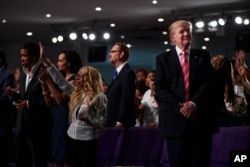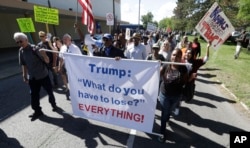Republican presidential nominee Donald Trump said Saturday at a predominantly black church in Detroit that he wanted to help rebuild the city and that “there are many wrongs that should be made right” in the United States.
Two months before the election, Trump is trying to attract the votes of African-Americans, who have traditionally voted overwhelmingly for Democratic candidates. Blacks make up 83 percent of Detroit's population.
“I am here to listen to you,” Trump told the congregation at the Great Faith Ministries International. “As I prepare to campaign all across the nation, I will have the chance to lay out my economic plans, which will be so good for Detroit.”
He said the nation needs “a civil rights agenda of our time,” with better education and good jobs.
Accompanying Trump was Omarosa Manigault, a former contestant on his reality television series who has been helping his campaign reach out to blacks. In the audience at the church was Detroit native Ben Carson, the retired neurosurgeon who ran against Trump in the primaries and is now advising the campaign. Trump also visited Carson’s childhood house in the city.
Many minority voters have found Trump's description of their lives to be condescending. African-American community leaders have dismissed his message, which has mainly been delivered in front of predominantly white audiences.
Public opinion surveys show support for Trump among black voters to be in the low single digits, far behind the figures for his Democratic rival, Hillary Clinton.
August visit
Ahead of the candidate's trip, Toni McIlwain, who formerly ran a community center that offered education and drug abuse prevention programs in one of Detroit's most distressed neighborhoods, said it took a lot of nerve for Trump to visit her city.
Many black residents, she said, haven't forgotten his visit to Michigan in August, in which he directed a message to blacks while speaking to a mostly white audience: "You live in your poverty, your schools are no good, you have no jobs, 58 percent of your youth is unemployed.''
He asked rhetorically what blacks had to lose by voting for him instead of Clinton.
"People picked up on'' Trump saying "you're all just crap,'' said McIlwain. "He generalized the total black community. How dare you talk to us like that and talk about us like that?''
Many Detroit residents are struggling, however. Nearly 40 percent are impoverished, compared with about 15 percent of Americans overall. Detroit's median household income, at $26,000, is less than half the median for the nation, census figures show.
The city's jobless rate is among the highest in the U.S., and public school students have trailed their peers on statewide standardized tests.
Some information for this report came from AP.







